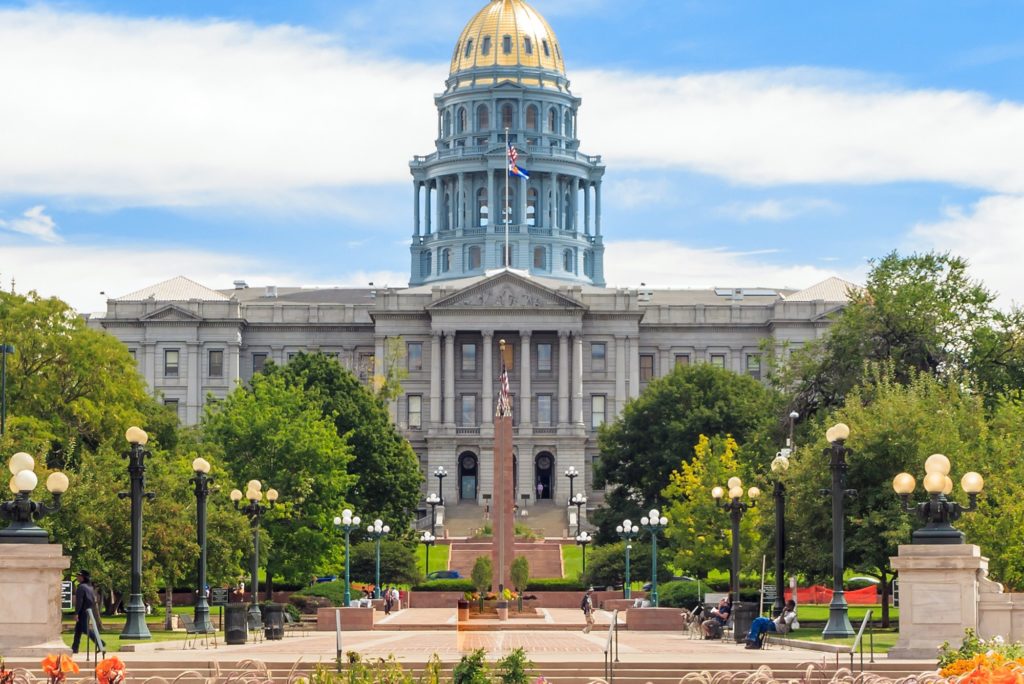Reflections from Prosper CO on the Legislative Session

The Denver Metro Chamber took 79 stances throughout the 2022 legislative session on bills impacting Colorado’s business climate, health and wellness, education and infrastructure. Additionally, the Chamber focuses on Prosper CO’s goals and missions to guide some of their policy work. There were several pieces of legislation that were followed closely by the Chamber and Prosper CO that helped advance women and people of color and aligned with the Chamber and Prosper CO’s commitment to equitably growing Colorado’s economy.
Here are some of the bills that Prosper CO was watching throughout the session, along with the justification for their stance and the bill’s outcome.
Housing
HB22-1051 Mod Affordable Housing Tax Credit
The Chamber supports HB22-1051: The Chamber recognizes that the lack of affordable workforce housing slows Colorado’s economic growth, undermines our ability to attract and retain talent, and poses a significant challenge to employees across the state. The affordable housing tax credit is a proven, effective and efficient solution to this problem, and we support the expansion and continuation of this program. We acknowledge, however, that the affordable housing crisis in Colorado is a multifaceted issue and will need a symmetrical response.
Outcome: Passed
HB22-1282 Innovative Housing Incentive Programs
The Chamber supports HB22-1282: Developers play a pivotal role in creating affordable housing. This bill allows them to access vital state funds so that Colorado's vibrant and competitive workforce can afford to live and work in the state.
Outcome: Passed
HB22-1304 State Grants Investments Local Affordable Housing
The Chamber supports HB22-1304: Providing grants to non-profits and local governments is an effective way to increase housing inventory. We support the use of American Rescue Plan Act (ARPA) dollars to address this critical issue, allowing Colorado to remain a competitive place to do business.
Outcome: Passed
SB22-146 Middle Income Access Program Expansion
The Chamber supports SB22-146: This bill supports a continuum of housing for the often-overlooked “missing middle.” At a time when housing prices are skyrocketing, this bill creates an opportunity for our workforce to access affordable housing. The fund has previously proven to be effective, and we applaud the legislature for continuing a viable program without re-inventing the wheel.
Outcome: Passed
SB22-159 Revolving Loan Fund Invest Affordable Housing
The Chamber supports SB22-159: By ensuring eligible recipients have access to favorable lending rates, Colorado is better positioned to retain a vibrant workforce despite rising housing prices. The revolving loan mechanism is a long-term solution that will positively impact affordable housing for many years to come.
Outcome: Passed
Jobs & Small Business Development
HB22-1002 Fifth Year High School Concurrent Enrollment
The Chamber supports HB22-1002. Colorado’s workforce shortage is one of the most critical issues facing businesses today. By expanding eligibility to participate in ASCENT, this bill broadens educational and workforce opportunities for students. This bill also aligns with the Chamber’s Prosper CO efforts, because it helps remove financial and institutional barriers that might keep students from pursuing higher education.
Outcome: Failed
HB22-1009 Continue Workforce Diploma Pilot Program
The Chamber supports HB22-1009. The Chamber believes that this bill benefits both local businesses, as well as adults who were unable to receive their high school diploma. Businesses will experience an increase of qualified workers in the region, which will help meet hiring needs, and adults in need of a career.
Outcome: Failed
HB22-1098 Department of Regulatory Agencies Barriers To Practice Regulated Professions
The Chamber supports HB22-1098.This bill falls under the Fair Chance Hiring Act, which the Chamber has supported in the previous years as part of its Prosper CO work. We believe that people with criminal histories deserve a fair and transparent process when applying for jobs, registrations, licenses and certifications related to their career goals. This bill will benefit both people with criminal histories, as well as businesses that are struggling to meet hiring needs. The Chamber supports the removal of the antiquated and unnecessary barriers that stand between a person and their right to join the workforce.
Outcome: Passed
HB22-1230 Employment Support And Job Retention Services
The Chamber supports HB22-1230: We appreciate efforts to help businesses address the lack of talent in a competitive labor market. This bill creates opportunities for businesses to access much-needed talent while also creating opportunities for employees to re-enter the workforce and find good-paying, meaningful jobs.
Outcome: Passed
HB22-1310 529 Account Apprenticeship Expenses
The Chamber supports HB22-1310. We appreciate the expansion of qualified distributions to support workforce development, and we value putting into statute flexibility for students pursuing nontraditional education models or career training.
Outcome: Passed
HB22-1366 Improving Students’ Postsecondary Options
The Chamber supports HB22-1366: Colorado has a steadily declining rate of completion for the Free Application for Federal Student Aid (FAFSA), currently at 43.4%. This bill equips teachers and other education professionals with the tools they need to help students navigate a complex federal application process. It is essential that Colorado invest in and develop local talent, and the low rate of completion disproportionately hurts low-income students and students of color who might be eligible for FASFA dollars. The Chamber supports this bill because it works toward economic goals identified by Prosper Colorado and our various talent initiatives.
Outcome: Passed
SB22-050 Work Opportunities For Offenders In Department Of Corrections
The Chamber supports SB22-050: When people who are imprisoned receive training and reskilling during their incarceration, they are better prepared to join the workforce and experience fewer barriers when released. This bill creates an opportunity to reengage a neglected segment of the workforce and equips them with the skills that employers are seeking, which is critical as many businesses are experiencing workforce shortages.
Outcome: Passed
SB22-099 Sealing Criminal Records
The Chamber supports SB-099: This bill comes as Colorado is in the midst of a widespread labor shortage. In July 2021, an all-time high of 7.7% of jobs in Colorado were unfilled according to the U.S. Bureau of Labor Statistics. This bill helps address the labor shortage by removing a barrier to employment, education and housing for residents with qualifying criminal records.
Outcome: Passed
SB22-140 Expansion of Experiential Learning Opportunities
The Chamber supports SB22-140: Colorado is currently experiencing a labor shortage, and we recognize that alternative pathways into the workforce are necessary to fill job vacancies and create a sustainable workforce pipeline. We support this bill because it creates the infrastructure necessary to upskill and reskill Coloradans as business needs evolve.
Outcome: Passed
SB22-163 Establish State Procurement Equity Program
The Chamber supports SB22-163: This bill is congruent with our Prosper CO initiatives to support minority entrepreneurship and lift up BIPOC businesses. We believe this is a good step to closing the statewide gap in procurement opportunities, so we have a more equitable system in place to support all business owners. We applaud the state legislature for prioritizing these initiatives.
Outcome: Passed
Overall, the majority of Prosper CO’s priorities for the session passed the legislature and are in their final phases of approval. We saw wins with several bills were passed this year to help increase the availability of workforce housing and incentivize developers. There were also strides taken in fair chance hiring with the passing of several bills that help formerly incarcerated people reintegrate into the workforce and upskill to receive better work opportunities.
We did see a few losses as well with the failures of HB22-1002 and HB22-1009, which would have expanded education opportunities and removed barriers to employment for those following a non-traditional route through the education system.
There’s still plenty to keep an eye on this year, as election season is only six months away. Prosper CO and the Denver Metro Chamber continue to monitor the legislature for any issues that could impact our effort to make Colorado’s economy equitable for all.
Read more about Prosper CO’s policy objectives or see all of the Denver Metro Chamber’s stances for the 2022 session.
The Push for Affordable Housing in Denver

Housing affordability has long been an issue not only in Denver, but across Colorado. The Denver Metro Chamber's Prosper CO is actively working to increase workforce housing options in the Denver Metro region.
As part of the Chamber’s advocacy work both at the state and local levels, we are prioritizing housing policy that increases the supply of homes in Colorado, with a focus on homeownership for families that make 60-120% area median income. Because we know that homeownership continues to be the most common way to build wealth in our nation, we are prioritizing policies that increase homeownership, such as those that:
● Increase flexible zoning codes to allow for duplexes, triplexes and quads.
● Establish better incentives for developers to build affordable housing.
● Reduce costs and burdens for developing affordable housing.
● Reduce time for permitting approval where needed.
● Address the lack of data and coordination by funding regional approaches and making more transparent data available when possible.
● Accelerate the mapping and use of public or other available land for development.
Read more about our policy priorities related to housing.
The Chamber board and Prosper CO have heard from many employers that this is an issue they want to solve and are ready to engage in advocacy and partnerships.
As an example, in November, Prosper CO activated its network of community leaders and employers on behalf of Denver Metro Habitat for Humanity to advocate for a zoning change for a vacant cul-de-sac in Aurora that will allow for the development of 20 workforce homes. These homes will be available for homebuyers making up to 80% of the area median income, or about $79,000 annually for a family of four. Prosper CO asked four large employers to contact an Aurora city councilman to advocate for the project. That councilman’s swing vote became a “Yes” vote, and the zoning change was approved.
This is a win for attainable housing in the Denver area and will allow families to build wealth through homeownership. Recent studies have shown that renting in most of Colorado is cheaper than buying a home, with the average Denver home costing $677,607 in December. However, homeownership is still the cheaper option in many counties across the United States. These statistics prove that Colorado is in desperate need of housing that is tailored to its workforce, and Prosper CO is working to fill this need.
The lack of workforce housing options is a barrier to both families and local businesses. Not only does it prohibit our region from growing its workforce, but many communities cannot afford to house their workers, meaning that an already established workforce is getting priced out of its own community.
While the approval for the affordable housing project in Aurora is a great step in the right direction, Prosper CO knows that we must proactively advocate for more flexible zoning at the municipal level, not just project by project.
The Chamber is also tracking state-level legislation, now that the 2022 legislative session is underway. Lawmakers recently introduced House Bill 1051, which extends the affordable housing tax credit for another 10 years after its set expiration in 2024, and it increases the allocation from $10 million to $15 million annually from 2023 to 2034. The Chamber and Prosper CO support this bill, seeing it as a step in the right direction for increasing our affordable housing options.
Follow the 2022 legislative session with the Chamber and stay informed on Prosper CO’s work.
Summary of 2021 Legislative Session
The 2021 Legislative Session has come to a close. The Denver Metro Chamber of Commerce was hard at work and took positions on many bills related to the work of Prosper CO. In all, the Chamber took positions on three bills related to housing, seven bills related to jobs and three bills related to small business development. All of these bills passed.
Housing
House Bill 21-1028: Annual Public Report Affordable Housing
This bill requires the Colorado Division of Housing to prepare a public report providing detail on the total money that the division or the Colorado State Housing Board received from any federal, state, public or private sources during the prior fiscal year.
House Bill 21-1134: Report Tenant Rent Payment Information to Credit Agencies
This bill creates a voluntary pilot program to establish credit through rental payment.
House Bill 21-1271: Department of Local Affairs Innovation Affordable Housing Strategies
This bill offers state assistance to local governments with the goal of creating more affordable housing strategies and practices.
Jobs
House Bill 21-1264: Funds Workforce Development Increase Worker Skills
This bill creates the Stimulus Investments in Reskilling, Upskilling and Next-Skilling Workers Program as an initiative of the State Workforce Development Council and appropriates $25 million for the program, which will facilitate training for unemployed and underemployed workers during times when the statewide unemployment rate exceeds 4%.
House Bill 21-1306: Accreditation of Postsecondary Institutions
This bill expands the accreditation process for postsecondary institutions to include the Department of Education and by the Council for Higher Education Accreditation as qualifying organizations that can accredit postsecondary institutions.
Senate Bill 21-106: Concerning Successful High School Transition
The bill requires the Department of Education and the State Board of Education to consider whether an innovative learning plan includes opportunities for students to participate in registered or unregistered apprenticeships, internships and technical training or skills programs through an industry provider, teacher training opportunities, concurrent enrollment and industry certificates. The bill also creates a fourth-year innovation pilot program to disburse state funding to postsecondary education and training programs on behalf of low-income students who graduate early from a high school participating in the pilot program prior to enrolling in the first or second semester of their fourth year of high school.
Senate Bill 21-119: Increasing Access to High Quality Credentials
This bill amends the Career Development Success Program by removing residency programs and expanding apprenticeship programs to include any industry program, not just construction programs. Additionally, the bill expands the definition of a qualified industry-credential program to include a career and technical education program that, upon completion, results in an industry-recognized credential.
Senate Bill 21-153: Department of Corrections Offender Identification Assistance Program
The bill requires the Department of Corrections to create a program to help offenders receive state-issued identification cards and other necessary identification documents.
Senate Bill 21-232: Displaced Workers Grant
This bill appropriates $15 million for the Colorado Opportunity Scholarship Initiative's Displaced Workers Grant, which is estimated to serve at least 3,000 displaced Colorado workers across the state, as well as help institutions of higher education scale high-demand programs.
Senate Bill 21-236: Increase Capacity Early Childhood Care & Education
This bill creates four new grant programs to increase capacity for early childhood care and education, encourage employer-based child care facilities, and improve recruitment and retention rates and salaries for early childhood educators.
Small Business Support
House Bill 21-1288: Colorado Startup Loan Program
This bill creates a $30 million revolving loan program to provide loans and grants to businesses looking to start, restart or restructure. These loans must be promoted to businesses that are owned by women, minorities, veterans and businesses in rural and underserved communities.
House Bill 21-1302: Continue COVID 19 Small Business Grant Program
This bill will create a grant program for small businesses that have experienced economic hardship because of the COVID-19 pandemic. Funding originally came from the federal Coronavirus Aid, Relief and Economic Security (CARES) Act, but not all businesses were able to secure funding by the deadline of Dec. 30, 2020. This bill allocates $15 million from the state general fund to continue the program and modifies grant criteria.
Senate Bill 241: Small Business Accelerated Growth Program
This bill establishes the Small Business Accelerated Growth Program under the Colorado Office of Economic Development to provide business development support to organizations with less than 20 employees. The Program must devise a marketing strategy in tandem with the Minority Business Office, Small Business Development Center and local and regional economic development entities to promote the program.
You can review all of the Chamber’s policy positions here.
